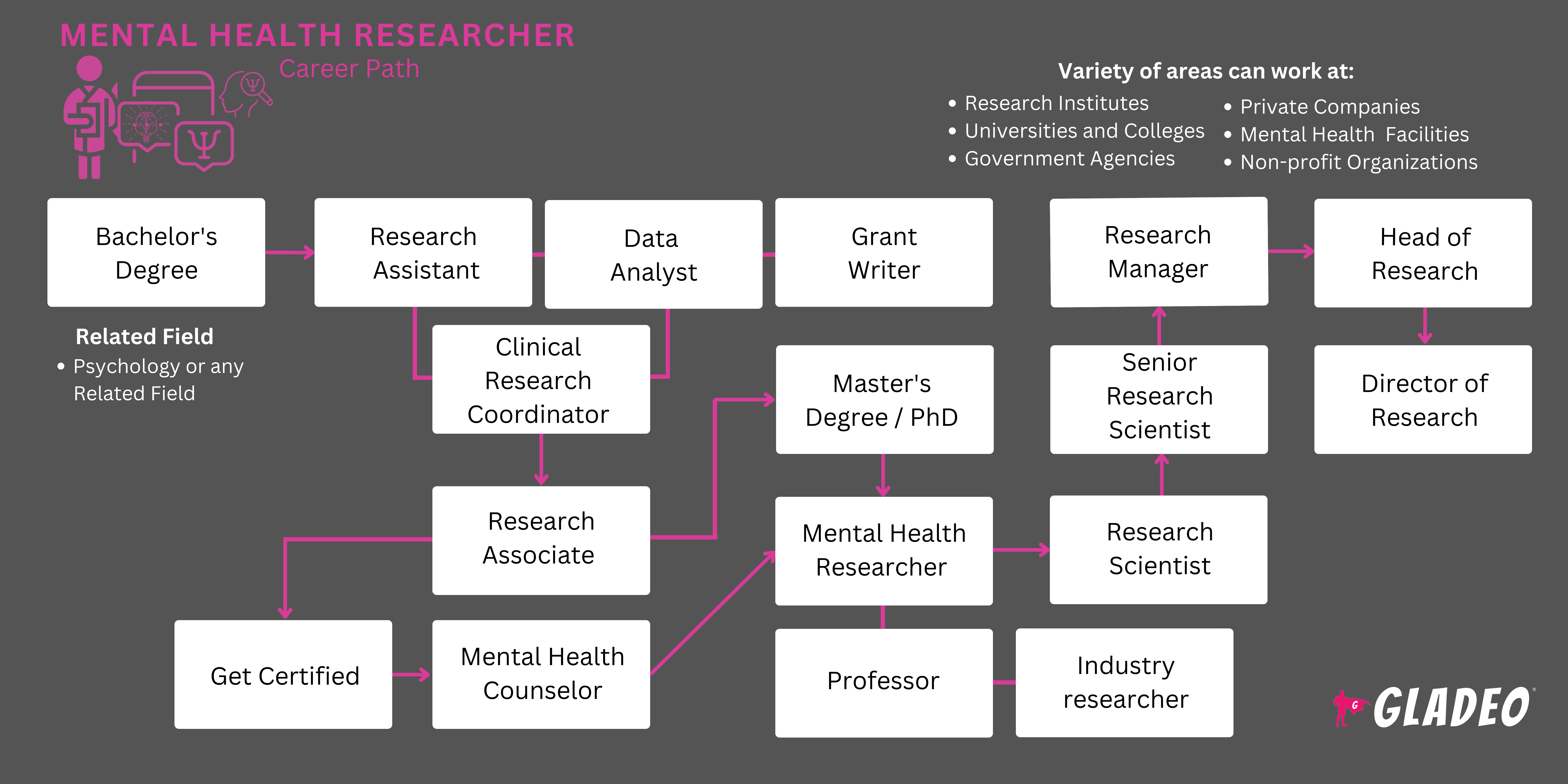스포트라이트
Psychiatric Researcher, Clinical Psychologist (with a research focus), Behavioral Health Scientist, Psychiatric Epidemiologist, Cognitive Psychologist (with a research focus), Neuropsychologist (with a research focus), Mental Health Policy Analyst, Mental Health Program Evaluator, Mental Health Data Analyst, Psychosocial Researcher, Health Psychologist (with a research focus), Community Mental Health Researcher
Mental health is simultaneously one of the most important and most overlooked aspects of human health. Why doesn’t it get the attention it needs? One reason is because it’s so complicated!
Medical science has a good understanding of the health issues related to our physical bodies. But the problems our minds can experience are harder to identify and address.
That’s why Mental Health Researchers have such important jobs. They contribute to the understanding of the human mind, help identify mental health issues, determine possible root causes, and develop effective treatments. Their work involves a great deal of designing and executing advanced research studies, analyzing data, and publishing findings.
Mental Health Researchers may specialize in areas such as depression, anxiety, schizophrenia, or PTSD. Their job requires a deep working knowledge of psychology, neuroscience, and statistical methods.
- Contributing to the understanding and treatment of mental health disorders
- Making an impact on individual and public health
- Opportunities to collaborate with experts in the field
- Shaping future mental health policies
근무 일정
- Mental Health Researchers typically work full-time, often in academic or clinical settings. Their schedules can be demanding, requiring flexibility to accommodate deadlines.
일반적인 의무
- Identify mental health conditions that require a deeper understanding
- Design studies, trials, and protocols to learn about chosen topics and test theories related to causes, prevention, and treatments
- Carry out studies and collect information through observation, interviews, and other sources
- Analyze and interpret study data. Record sessions or take notes, as appropriate
- Ensure study participant information is kept confidential
- Collaborate with fellow researchers, clinicians, and institutions. Share findings and devise ways to work together, if applicable
- Publish findings in scientific journals and blogs, while ensuring participant privacy
- Present findings at conferences and professional gatherings
- Apply for grants and funding to support research projects
추가 책임
- Maintain accurate records of research activities
- Ensure compliance with ethical guidelines and regulations
- Mentor and supervise students and junior researchers
- Participate in community outreach and education initiatives
- Keep up with research and developments, including software programs
소프트 스킬
- 능동적 인 듣기
- 적응성
- 분석적 사고
- 세부 사항에주의
- 의사소통 기술
- 비판적 사고
- 공감
- 윤리적 판단
- 독립의
- 무결성
- Observation
- 조직
- 끈기
- 고집
- 문제 해결
- 팀워크
- 시간 관리
기술 능력
- Academic writing and publishing
- Artificial intelligence programs for research
- Data management
- Grant writing
- Neuroimaging techniques (e.g., MRI, fMRI)
- Psychometric testing
- Research design and methodology
- Statistical analysis software (e.g., SPSS, R, SAS)
- 교육 기관
- Hospitals and healthcare facilities
- 정부 기관
- 비영리 단체
- 제약 회사
- Private research firms
Mental Health Researchers face high expectations to produce tangible results. There’s always pressure to contribute to the field, which requires designing rigorous studies, analyzing complex data, and publishing results.
The research can be emotionally draining when dealing with vulnerable populations who have experienced trauma. However, such direct interaction with participants is sometimes needed, which demands a degree of professional detachment.
Researchers often work long hours to meet deadlines. They also have to secure funding, requiring skills in grant writing and networking. Despite the challenges, the rewards of advancing mental health and improving patient outcomes make the sacrifices worthwhile!
Technology such as AI and machine learning is playing a crucial role in analyzing complex data, finding patterns, and predicting outcomes. This, in turn, is enabling more accurate diagnoses and personalized treatment plans. Meanwhile, advances in genetics and neuroimaging allow researchers to tailor treatments to individual needs, boosting efficacy and reducing side effects.
There’s growing interest in the impacts of social, demographic, and environmental factors on mental health. This is prompting researchers to take a more holistic approach as they explore how such variables influence mental well-being and how that information can be used to potentially prevent problems.
Mental Health Researchers are very observant. They’re also curious about the human mind and human behavior. They likely enjoyed psychology and sociology growing up, and some of them may have had firsthand experience dealing with mental health issues within their families.
- Mental Health Researchers are usually doctors of psychology. They may start their educational journey with a bachelor’s in psychology, neuroscience, or a related field, followed by a master’s degree then PhD in psychology, psychiatry, or a related discipline
- 공통 과정 과목은 다음과 같습니다:
- Abnormal psychology
- Clinical psychology
- Cognitive neuroscience
- Developmental psychology
- Ethics in research
- Psychopharmacology
- Research methods
- 통계 분석
- Vital research experience is gained via internships, assistantships, or independent projects. Some researchers engage in clinical practice to inform their work
- Researchers don’t usually need to be certified or licensed – unless they are involved in clinical practice or if their research includes direct patient interaction
> Under such circumstances, they may need state licensure, which requires a set number of supervised hours of experience plus a passing score on the Examination for Professional Practice in Psychology
- Researchers often complete training in research ethics, specific techniques like neuroimaging or psychometrics, and certification in human subjects research
- Grant writing is another commonly needed skill, which can be learned through self-study, practice, or short online courses!
- Continuing education is necessary to keep up with advancements such as new technologies and methods
- Look for well-ranked programs in psychology, psychiatry, neuroscience, and related fields.
- Programs should ideally be accredited by the American Psychological Association and feature active research labs plus experienced faculty. There should also be ample opportunities for internships or other practical learning experiences.
- Screen each program’s website to learn about enrollment data, admissions requirements, and graduation statistics.
- Look for on-campus student organizations that could help you grow professionally!
- 수업료 및 수수료 비용을 비교하여 주 내 비용과 타주 비용을 확인하세요.
- Review scholarship and financial aid options, including federal aid Pell Grants.
- Take courses in psychology, sociology, biology, chemistry, English composition, and mathematics
- Participate in relevant science fair projects and psychology-related clubs
- Check out videos related to mental health research and read peer-reviewed journals
- 고등학교 지도교사와 협력하여 대학 수준의 교과 과정을 준비할 수 있도록 하세요.
- Decide what area of mental health research you’d like to focus on. Map out your long-term education plans
- 직장이나 기타 약속으로 인해 대학에 풀타임으로 다닐지 파트타임으로 다닐지 결정합니다.
- 온라인 또는 하이브리드 학위가 자신에게 더 적합한지 고려하기
- Join professional and student organizations. Work on getting published in academic journals
- Study grant writing and strategies for applying for funding

- Complete applicable certification or licensure requirements (if needed in your state or for your area of specialization)
- Review job postings on portals such as Indeed.com or Mental Health America’s career center page
- Search online for tips to make your Mental Health Researcher resume more impactful
- Read sample interview questions and practice your job interview skills via mock interviews
- 학교의 커리어 센터에서 제공하는 리소스를 활용하세요.
- Ask professors and supervisors if you can list them as references or get letters of recommendation from them
- Before going into an interview, brush up on the latest news about the field. Be ready to discuss your insights about relevant trends and changes
- Talk with your supervisor about advancement opportunities
- Take on leadership roles in organizations like the American Psychological Association to network and access professional development resources
- Pursue advanced certifications or specialized training
- Continue to get published in peer-reviewed journals. Volunteer to be a peer reviewer yourself! Also, time permitting, think about writing a book!
- Attend workshops and conferences to stay updated on practices and technologies
- Collaborate on interdisciplinary projects. Join or create consortia for large-scale projects
- Seek ambitious grant funding to support and expand your research
Develop strong public speaking skills - Train and mentor new researchers and assistants thoroughly
- Teach academic courses at universities. Apply for postgraduate fellowships
- Participate in international research communities
- Maintain high ethical standards and a reputation for diligence and integrity
- Consider relocating if necessary to move up!
웹사이트
- American Academy of Child and Adolescent Psychiatry
- 결혼 및 가족 치료를위한 미국 협회
- American Association of Suicidology
- American Board of Professional Neuropsychology
- American Board of Professional Psychology
- 미국 상담 협회
- 미국 교육 연구 협회
- 미국 가족 치료 아카데미
- American Group Psychotherapy Association
- American Mental Health Counselors Association
- American Neuropsychiatric Association
- 미국 심리학 협회
- American Society of Clinical Hypnosis
- American Telemedicine Association
- APA Division of School Psychology
- Association for Behavioral and Cognitive Therapies
- Association for Behavior Analysis International
- Association for Psychological Science
- Association of Psychology Postdoctoral Internship Centers
- Association of State and Provincial Psychology Boards
- ClinicalTrials.gov
- 예외적 인 어린이를위한 협의회
- Eastern Psychological Association
- EMDR 국제 협회
- International Congress of Cognitive Psychotherapy
- International Neuropsychological Society
- Junior Researchers in EARLI
- Midwestern Psychological Association
- National Academy of Neuropsychology
- National Alliance for the Mentally Ill
- National Association of Cognitive-Behavioral Therapists
- National Association of School Psychologists
- 전국 사회 복지사 협회
- National Black Counseling Psychologists
- 공인 카운슬러를위한 전국 이사회
- National Institute of Mental Health
- National Register of Health Service Psychologists
- New England Psychological Association
- PubMed
- ResearchGate
- Rocky Mountain Psychological Association
- Society for Health Psychology
- Society for the Advancement of Psychotherapy
- Society of Behavioral Medicine
- Society of Clinical Psychology
- Society of Counseling Psychology, APA Division 17
- Society of Pediatric Psychology
- Southeastern Psychological Association
- Southwestern Psychological Association
- Association for Behavior Analysis International
- VA Medical Centers
- Western Psychological Association
- World Federation for Mental Health
책
- Research Methods in Psychology, by John Shaughnessy, Eugene Zechmeister, and Jeanne Zechmeister
- Statistical Methods for Psychology, by David C. Howell
- The Anatomy of Hope, by Jerome Groopman
Mental Health Researchers are critical behind-the-scenes subject matter experts. But such research-intense roles aren’t everybody’s cup of tea! That’s why we’ve put together a list of related occupations below for you to check out!
- Advanced Practice Psychiatric Nurse
- Behavioral Therapist
- Clinical Neuropsychologist
- Clinical Psychologist
- 의료 사회복지사
- Health Policy Analyst
- 결혼 및 가족 치료사
- 정신 건강 상담사
- Neuropsychologist
- Neuroscientist
- 작업 치료사
- Psychiatrist
- Public Health Researcher
- 학교 심리학자
- Substance Abuse Social Worker
뉴스 피드

주요 채용 정보

온라인 과정 및 도구

연봉 기대치
New workers start around $51K. Median pay is $80K per year. Highly experienced workers can earn around $109K.






